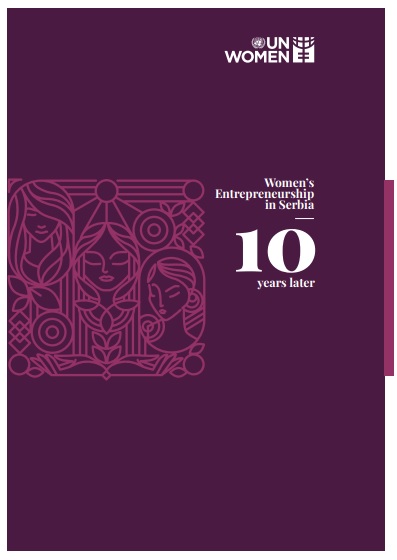The first study on women’s entrepreneurship in Serbia was published in 2012 based on research conducted by SeConS, an organization for applied research and policy analysis, at the initiative of the then Ministry of Economy and Regional Development, with the support of UN Women. The baseline study also contained a large number of recommendations aimed at informing the policies to encourage the development of women’s entrepreneurship and close the gender gap in entrepreneurship and beyond, in economic participation or employment.
In 2021, the Ministry of Economy launched a new initiative to review the state of women’s entrepreneurship after a little more than ten years and to identify changes, achievements, challenges and the potential of women’s entrepreneurship that future policies should focus on. This new research was carried out by the organization SeConS with the support of UN Women as part of the project Support to priority actions for gender equality in Serbia, with the aim to provide the Ministry of Economy with the findings necessary for the formulation of policies focused on encouraging women’s entrepreneurship.
The goals of the research were diverse:
- to establish whether there have been changes in the scope, structure, and characteristics of women’s entrepreneurship;
- to establish how the profile of women entrepreneurs looks like today and whether there have been any changes in this regard, which would be an indication that certain groups of women enter and stay in business more while other groups stay less compared to the period ten years ago;
- to find out what obstacles women entrepreneurs encounter today and whether these obstacles and challenges differ from those encountered ten years ago;
- to establish how successful women entrepreneurs are today and what are the factors of such success;
- to establish how the COVID-19 pandemic affected women’s entrepreneurship, how helpful state support measures were to them while dealing with business conditions marked by the pandemic, and how resilient women’s businesses are in general to this and other similar crises;
- to examine the extent to which women entrepreneurs are informed and aware of the impact of climate change on their business, to what extent they apply “green” business practices, i.e. those practices that reduce or have no harmful impact on the environment and the climate, and what is their potential for the transition towards “green” business that is essential for the “greening” or decarbonization of the economy;
- to answer the question of how women entrepreneurs harmonize their private and business lives and whether they differ in terms of the balance between these two spheres of life compared to former women entrepreneurs?
In addition to these goals that were aimed at the comprehensive monitoring of various characteristics of women’s entrepreneurship and the monitoring of changes, the research also had a special goal to examine the effects of two programmes designed by the Ministry of Economy to support women’s entrepreneurship: Entrepreneurship development programme through financial support for beginners in business and the Programme for promotion of entrepreneurship through financial support for women entrepreneurs and young people.













